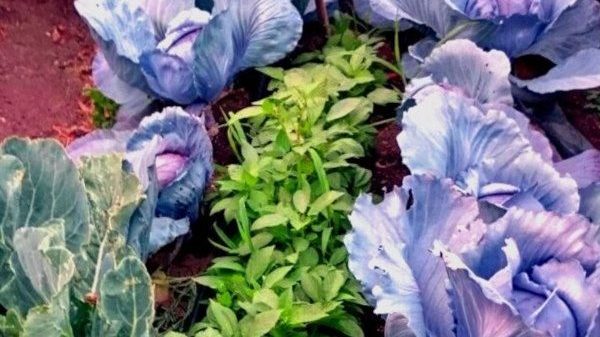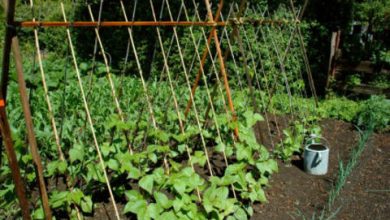5 Ecological Insecticides Against Pests and Diseases
As I told you in the previous post, one of the key methods of integrated pest control is the use of ecological or natural fungicides and insecticides (not chemical or synthetic) to combat pests and diseases in crops. There are many commercial natural remedies that you can buy and that are suitable for Organic Farming, although you can also make them yourself.

5 Organic insecticides of mineral origin against pests
A few days ago I published the post “ Organic pesticides for the organic garden ”, in which I told you about several organic insecticides that were of organic origin, that is, extracts from plants such as horsetail, the Neem tree or the chrysanthemum.
Today we will continue with the theme of ecological insecticides and we will see 5 natural remedies, this time inorganic. Ecological insecticides of mineral origin, unlike organic ones, are not derived from plants or living organisms, but are products of mineral origin, such as sulfur. Let’s see them!
1. POTASSIUM SOAP
This is one of the most used organic insecticides or natural remedies in organic gardens. It is the typical «grandmother’s soap»: homemade or purchased soap but that is natural -without chemicals- and made with potash (not with soda, since soda is corrosive to plants).
Dilute it in a little boiling water so that it dissolves well, add a liter of water for every 30-40 g of soap and spray it at dusk so that it is not exposed to the sun when it is just applied.
Potash soap is an effective ecological insecticide against aphids, thrips, spider mites, mealybugs, whiteflies and also against some fungi such as bold or botrytis… Apply it by spraying the preparation where you see the cobwebs or the larvae or adults of these pests.

2. SULFUR
Powdered or micronized sulfur is used in the orchard as a natural fungicide to combat powdery mildew and other orchard fungi. It is also effective against mites such as red spiders and to repel insects in general.
You can apply it by sprinkling it directly, although it adheres better if it is applied mixed with a liquid solvent sprayed on the plants, in this way the application is more homogeneous and more efficient since part is not lost through the air. Mix the sulfur with an adherent-dispersant liquid, with these two liquids separately or use «wettable sulfur» mixed with water.
Apply it when it is not too cold or too hot, with a temperature between 10 and 25 ºC, better at dusk on hot days.
3. COPPER
Copper is also a very versatile natural fungicide. It is effective against superficial fungi such as powdery mildew but also against fungi that develop inside the plant and against some bacteria. It can be purchased as copper oxychloride or as cuprous oxide.
Bordeaux broth also has copper. It is an ecological preparation that contains copper sulfate (that is, it also has sulfur) and lime. If you want to do it yourself, dissolve 300 grams of lime in 5 liters of water and 100 grams of copper sulfate in 5 liters of water. Then mix the two solutions, stir the mixture and apply it with a sprayer in the evening.
4. PARAFFIN OIL
Mineral oils, such as paraffin oil, are broad-spectrum ecological insecticides.
Paraffin oil is a natural remedy suitable for organic farming that is used to eliminate the plague of aphids, cottony mealybugs, mites such as red spiders and other common pests such as whiteflies, thrips, etc.
The paraffin forms a waxy layer on the insects so that it prevents them from breathing and they die. Dilute a tablespoon of liquid paraffin in 10 liters of water and spray it on the pest insects.
5. OTHER MINERAL OILS
You can also buy insecticidal mineral oils. Mineral oils are broad-spectrum ecological insecticides, that is, they are valid for killing various types of pests. Also, you can use them to prevent them before they appear. They are usually made from paraffin or other hydrocarbons. They are also commonly called «summer oil» or «winter oil».
If you want an organic garden, you must be careful and buy a mineral oil suitable for Organic Farming, which comes from saturated hydrocarbons (which are the least toxic for plants).
You should also know that paraffin oil and other mineral oils are ecological insecticides that should not be applied together with products such as Bordeaux mixture or sulfur. Leave two weeks to a month between the application of these organic insecticides and mineral oils.
References
- Abrol, D., Shankar, U. (2016). Chapter 20 – Integrated Pest Management. Editor(s): Surinder Kumar Gupta. Breeding Oilseed Crops for Sustainable Production,
Academic Press. 523-549. - Brito, R., Pereyra, E., Sarica, C. (2018).Well trajectory effect on slug flow development. Journal of Petroleum Science and Engineering. 167, 366-374.
- Bianchi, FJJA, & Van Der Werf, W. (2004).Model evaluation of the function of prey in non-crop habitats for biological control by ladybeetles in agricultural landscapes. Ecological Modelling, 171, 177–193.
Well, that’s it for today’s post! You can see more tricks to control pests in the «Pests and diseases » category and in this video that I leave you from Canal Agrohuerto TV about the control of common pests in the orchard».
I hope I have helped you and that you can also tell us about more natural or ecological insecticides that you know to control pests and diseases in the garden in a sustainable way and taking care of the environment !
If you want more information on the control of pests and diseases with natural remedies, I recommend you read the post on the integrated fight in organic gardens.

![Photo of Spanish Plants in Danger of Extinction [List + Images]](https://www.complete-gardening.com/wp-content/uploads/2021/06/Alliaceae_1587648036-390x220.jpg)

![Photo of Ulmus Pumila: [Cultivation, Irrigation, Associations, Pests and Diseases]](https://www.complete-gardening.com/wp-content/uploads/2022/08/ulmus-pumila-cultivation-irrigation-associations-pests-and-diseases-390x220.png)
